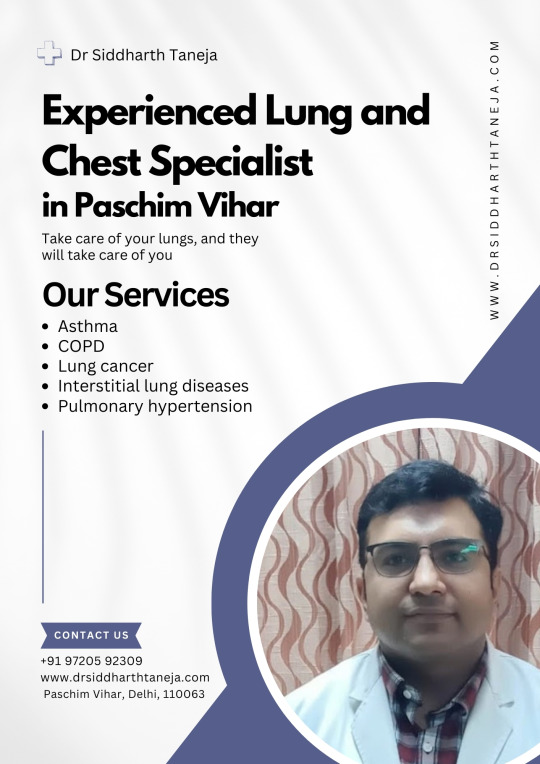Dr. Siddharth Taneja is one of the best pulmonologists in Delhi with over 14 years of experience in diagnosing and treating a wide range of lung diseases and chest problems.
Don't wanna be here? Send us removal request.
Text

An experienced Asthma Doctor in North Delhi providing comprehensive diagnosis and treatment for asthma and other respiratory conditions. With a patient-focused approach, the doctor offers personalized care to help manage symptoms, improve lung function, and enhance quality of life.
#KidneyHealth#HypertensionAwareness#BloodPressureControl#Nephrology#HealthyKidneys#EarlyDetection#TakeAction#HealthCheck#ProtectYourHealth#YoungAndHealthy#AsthmaCare#BreatheEasy#HealthTips#StayHealthy#WellnessJourney
0 notes
Text

Providing expert care for asthma and respiratory conditions in North Delhi with advanced diagnosis and personalized treatment plans. Focused on improving lung health and enhancing quality of life through effective management and preventive care.
#KidneyHealth#HypertensionAwareness#BloodPressureControl#Nephrology#HealthyKidneys#EarlyDetection#TakeAction#HealthCheck#ProtectYourHealth#YoungAndHealthy#AsthmaCare#BreatheEasy#HealthTips#StayHealthy#WellnessJourney
0 notes
Text

#KidneyHealth#HypertensionAwareness#BloodPressureControl#Nephrology#HealthyKidneys#EarlyDetection#TakeAction#HealthCheck#ProtectYourHealth#YoungAndHealthy#AsthmaCare#BreatheEasy#HealthTips#StayHealthy#WellnessJourney#AsthmaSupport#RespiratoryHealth#mental health#health & fitness#healthcare#health and wellness
0 notes
Text

An Experienced Lung and Chest Specialist diagnoses and treats a wide range of respiratory conditions, including asthma, COPD, pneumonia, and lung infections. Using advanced diagnostic techniques such as imaging, pulmonary function tests, and bronchoscopy, they ensure accurate assessment and effective treatment. They develop personalized treatment plans that may include medication management, pulmonary rehabilitation, and lifestyle modifications to improve lung health. With expertise in respiratory care, they help patients manage chronic lung diseases, breathing difficulties, and other pulmonary conditions to enhance overall well-being.
0 notes
Text

Looking for an Asthma Doctor in North Delhi? Get expert care for asthma, allergies, and respiratory issues. Specialized treatment for chronic cough, breathlessness, and lung health. Book a consultation for personalized care and better breathing today!
0 notes
Text
Dr. Siddharth Taneja is one of the best pulmonologists in Delhi with over 14 years of experience in diagnosing and treating a wide range of lung diseases and chest problems. As a leading chest doctor in Paschim Vihar, Dr. Taneja specializes in diagnosing and treating conditions like asthma, COPD, and chronic bronchitis. With a focus on personalized treatment plans and the latest medical advancements, he ensures that every patient receives top-notch care for a healthier life. If you're looking for a trusted pulmonologist to address your chest issues, Dr. Siddharth Taneja is the expert you can rely on.
0 notes
Text
What Is a Pulmonologist? When To See One & What To Expect
Summary:
Pulmonologists are medical specialists who diagnose, treat, and manage lung and respiratory system conditions. If you suffer from chronic respiratory issues, breathing difficulties, or lung infections, visiting a pulmonologist doctor may be the best course of action. This article will explore what pulmonologists do, the conditions they treat, when to see one, and what to expect during your visit. We’ll also discuss the differences between a pulmonologist and other specialists, such as chest specialists, respiratory doctors, and cardiologists. If you’re experiencing persistent lung-related symptoms, a pulmonologist is the expert you should consult to improve your quality of life.
What is a Pulmonologist?
A pulmonologist doctor specializes in diagnosing and treating diseases and disorders that affect the lungs and respiratory system. Pulmonologists have extensive training in pulmonary medicine, which includes the lungs, airways, chest cavity, and diaphragm. They are experts in managing diseases such as asthma, chronic obstructive pulmonary disease (COPD), pneumonia, and lung cancer, among others.
Unlike general practitioners, pulmonologists have specialized knowledge of lung function and the complex interactions of the respiratory system. They provide both preventive care and ongoing treatment to manage chronic conditions, ensuring patients breathe easier and live healthier lives.
Why Would You Need to See a Pulmonologist?
You should see a pulmonologist doctor if you experience persistent or severe respiratory issues that your primary care doctor cannot manage. These include chronic symptoms such as:
Shortness of breath: Difficulty breathing or feeling winded during regular activities.
Chronic cough: A cough that lasts for more than three weeks or worsens over time.
Wheezing: A high-pitched whistling sound when breathing, often linked to asthma or COPD.
Chest pain: Pain that is persistent or occurs with breathing.
Excessive mucus production: Constant production of mucus, particularly in the morning.
Fatigue: Unexplained tiredness that does not improve with rest.
Blood in sputum: Coughing up blood or blood-streaked mucus, which could indicate serious lung conditions.
Additionally, if you have a family history of lung diseases such as lung cancer or COPD, seeing a pulmonologist regularly may help with early detection and preventive care.
What is the Difference Between a Respiratory Doctor and a Pulmonary Doctor?
The terms “respiratory doctor” and “pulmonary doctor” are often used interchangeably, but technically, they have slightly different meanings:
A respiratory doctor typically refers to a healthcare professional focused on managing and treating a range of respiratory conditions. This might include asthma, sleep apnea, and acute conditions like pneumonia. They are experts in understanding the breathing process and any conditions that can interfere with it.
A pulmonary doctor or pulmonologist has a more specialized focus on the lungs and diseases of the respiratory system. Pulmonologists deal specifically with chronic lung diseases such as emphysema, pulmonary fibrosis, and lung cancer. They are also involved in intensive care management for patients with severe lung conditions.
While both specialties focus on the respiratory system, pulmonologists have a narrower focus on lung-specific diseases, while respiratory doctors may take a broader approach, including conditions of the airway and lungs.
What’s the Difference Between a Cardiologist and a Pulmonologist?
Both pulmonologists and cardiologists deal with vital organ systems, but their areas of expertise differ:
Cardiologists focus on diagnosing and treating heart-related diseases, such as heart failure, coronary artery disease, arrhythmias, and hypertension. They are responsible for managing cardiovascular conditions and the circulatory system.
Pulmonologists, on the other hand, specialize in the lungs and respiratory system. They treat chronic conditions such as asthma, COPD, and lung infections, as well as conditions involving difficulty in breathing and lung capacity.
While there is some overlap—especially in conditions like pulmonary hypertension, which affects the lungs and heart—pulmonologists and cardiologists treat separate organ systems. For example, a pulmonologist would treat chronic lung conditions that impair breathing, while a cardiologist would focus on managing conditions that affect the heart and circulation.
A Note from Dr. Siddharth Taneja:
As a pulmonologist with years of experience, I emphasize the importance of early detection and management of respiratory diseases. Lung diseases, if untreated, can significantly impact your quality of life. Seeing a pulmonologist doctor early can help you avoid complications and improve your respiratory health. Whether you suffer from asthma, COPD, or another lung-related disease, it is crucial to consult with a specialist who can provide tailored care for your needs.
What Does a Pulmonologist Do?
A pulmonologist doctor evaluates, diagnoses, and treats patients with respiratory conditions. Their role involves the following:
Diagnosing lung diseases: A pulmonologist uses a variety of tools, including chest X-rays, CT scans, and pulmonary function tests (PFTs), to determine the cause of your symptoms.
Developing treatment plans: Based on the diagnosis, pulmonologists develop personalized treatment strategies that may include medications, lifestyle changes, and sometimes, therapies such as oxygen support.
Monitoring chronic conditions: If you have a chronic lung disease like asthma or COPD, your pulmonologist will monitor your condition over time to ensure the treatment plan remains effective.
Performing procedures: Pulmonologists may perform various diagnostic or therapeutic procedures, including bronchoscopy (a procedure to view the airways) and thoracentesis (draining fluid from the lungs).
Educating patients: Pulmonologists educate patients about managing their lung diseases, offering advice on managing triggers, avoiding pollutants, and taking medications correctly.
What Conditions Do Pulmonologists Treat?
Pulmonologists are experts in managing a wide range of respiratory and lung conditions, including:
Asthma: A chronic condition that causes inflammation and narrowing of the airways, making breathing difficult.
Chronic Obstructive Pulmonary Disease (COPD): A group of progressive lung diseases, including emphysema and chronic bronchitis, that make it harder to breathe.
Pneumonia: A lung infection that can cause difficulty breathing, coughing, fever, and chest pain.
Lung cancer: A type of cancer that begins in the lungs, with treatment options depending on the stage and type of cancer.
Pulmonary fibrosis: A condition that causes scarring of the lung tissue, which can lead to shortness of breath and reduced lung function.
Sleep apnea: A sleep disorder where breathing repeatedly stops and starts during sleep.
Pulmonary hypertension: High blood pressure in the arteries of the lungs, which can strain the heart and affect lung function.
These are just a few of the conditions that a pulmonologist manages. If you experience persistent breathing difficulties, it's essential to see a specialist who can evaluate and treat your symptoms appropriately.
What Will a Pulmonologist Do on the First Visit?
During your first visit to a pulmonologist doctor, expect the following:
Comprehensive medical history: The doctor will ask about your symptoms, family history of respiratory diseases, lifestyle factors (such as smoking), and any medications you are currently taking.
Physical examination: The doctor will examine your chest and lungs, listening for abnormal sounds like wheezing or crackling that might indicate lung problems.
Diagnostic tests: Depending on your symptoms, the pulmonologist may recommend diagnostic tests, such as pulmonary function tests (PFTs), blood tests, or imaging studies (X-rays, CT scans).
Discussion of treatment options: Based on the diagnosis, your pulmonologist will discuss potential treatments or therapies and develop a care plan that best suits your condition.
What Tests Does a Pulmonologist Run?
Pulmonologists use a variety of tests to diagnose and monitor respiratory conditions. These include:
Pulmonary function tests (PFTs): These tests measure how well your lungs are functioning by assessing airflow, lung volume, and gas exchange.
Chest X-rays or CT scans: Imaging tests that help pulmonologists detect abnormalities in the lungs, such as infections, tumors, or scarring.
Arterial blood gas (ABG) test: A test that measures the oxygen and carbon dioxide levels in your blood to evaluate lung function.
Bronchoscopy: A procedure that involves inserting a thin tube into the airways to examine the lungs directly and take samples for testing.
FAQs
Is a chest specialist the same as a pulmonologist? Yes, a chest specialist is often another term for a pulmonologist. Both focus on lung and respiratory conditions.
How do I know if I need to see a pulmonologist? If you have persistent breathing problems, shortness of breath, or a chronic cough, it’s advisable to consult a pulmonologist.
Can a pulmonologist treat sleep apnea? Yes, pulmonologists can diagnose and treat sleep apnea, often using therapies such as CPAP machines.
What conditions can pulmonologists treat? Pulmonologists treat conditions like asthma, COPD, pneumonia, lung cancer, and pulmonary fibrosis.
Are pulmonologist visits covered by insurance? Most insurance plans cover pulmonology visits, but it’s always best to check with your provider.
Conclusion
A pulmonologist doctor plays a critical role in managing respiratory health. Whether you're struggling with asthma, chronic cough, or a more severe lung condition, consulting with a pulmonologist ensures you're in expert hands. Early intervention and regular check-ups can prevent complications and improve quality of life. If you experience persistent breathing issues, don’t hesitate to see a pulmonologist. With the right care, many lung conditions can be managed effectively, helping you breathe easy again.
0 notes
Text
1 note
·
View note
